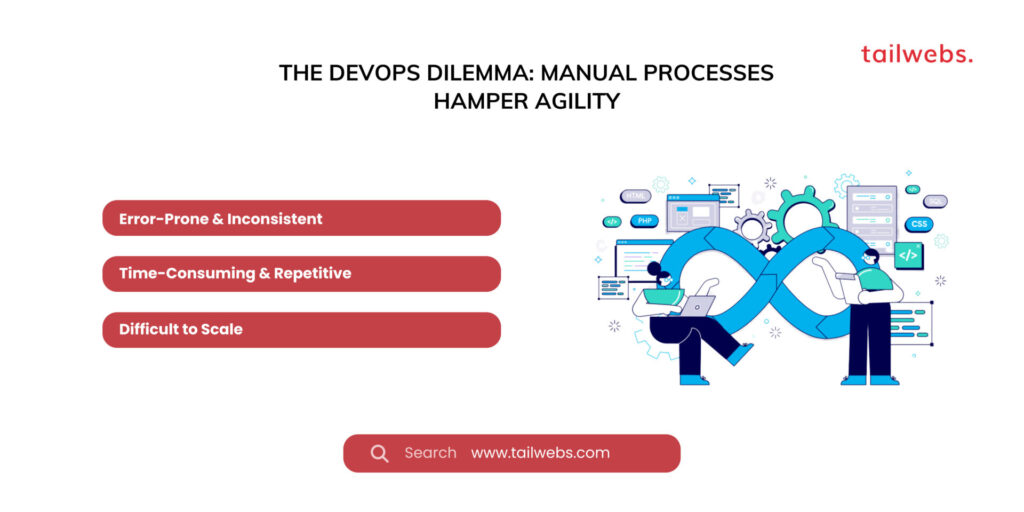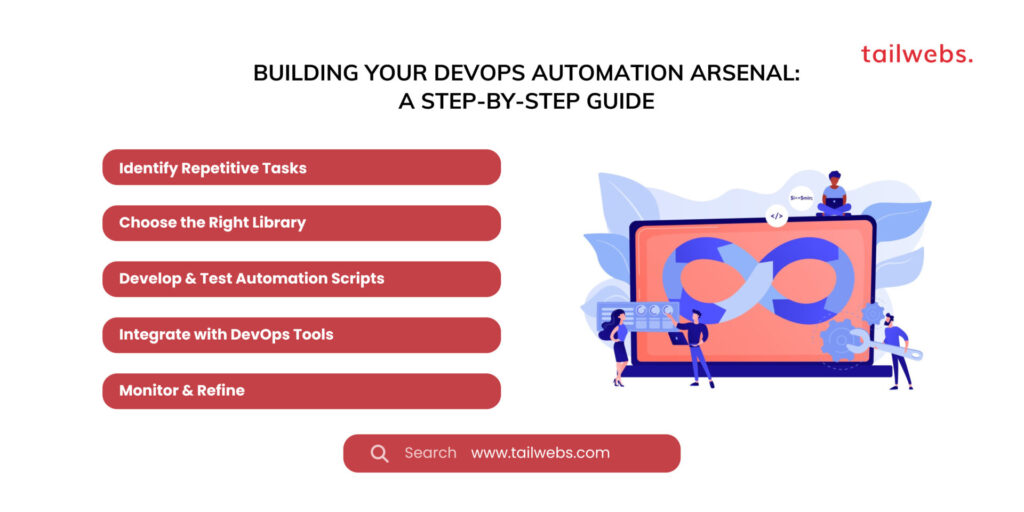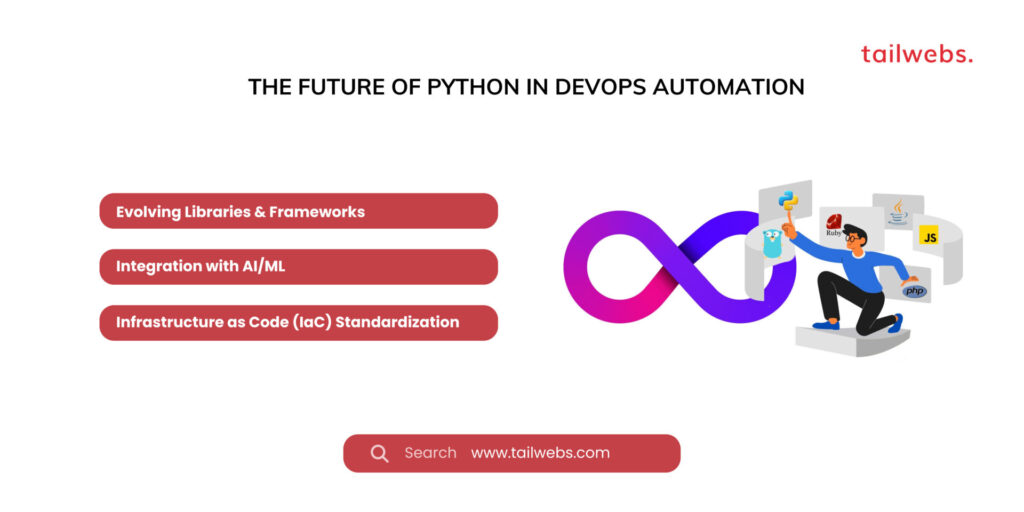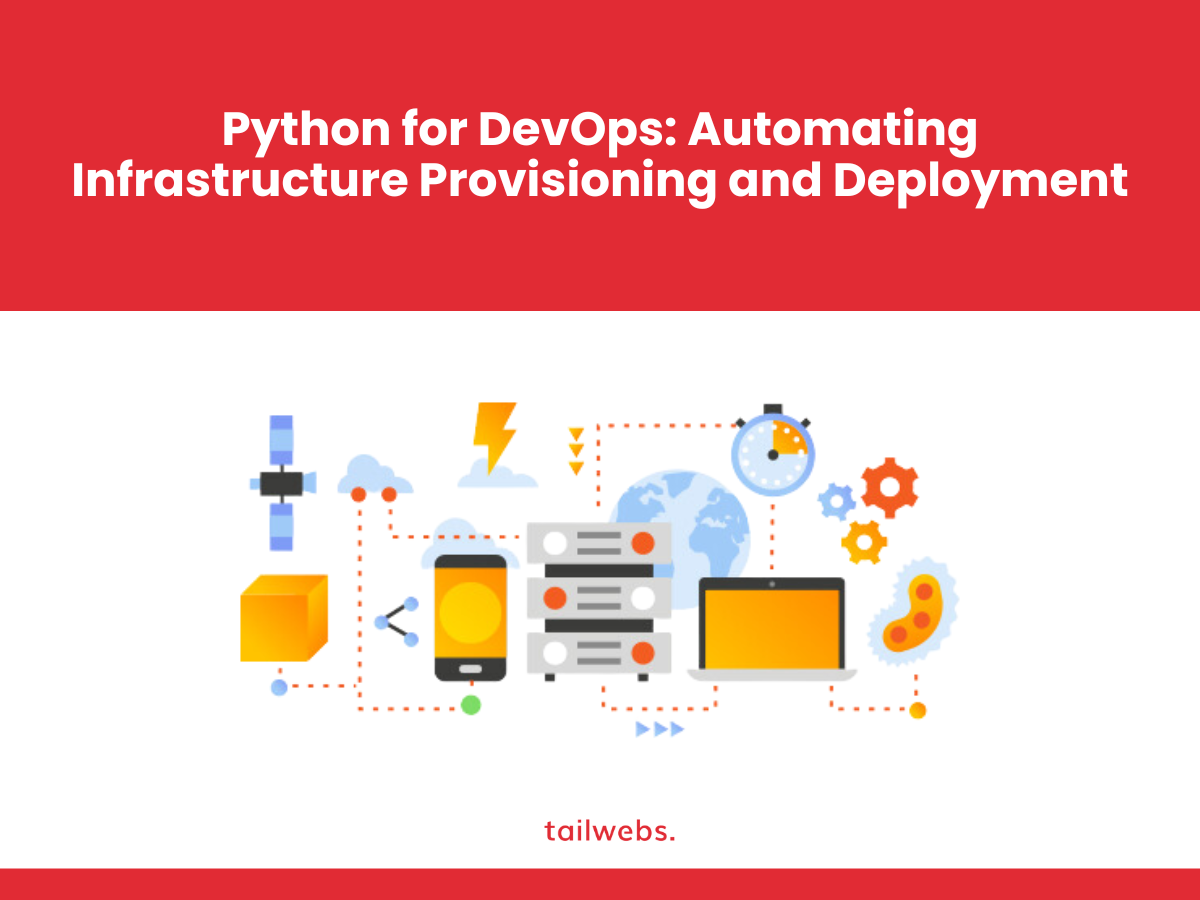Python for DevOps? In today’s era of continuous delivery and DevOps practices, streamlining infrastructure provisioning and deployment is crucial for agility and efficiency. Manual processes are error-prone and time-consuming, hindering rapid application development and updates. Python, with its versatility and extensive libraries, emerges as a powerful tool for DevOps engineers to automate these critical tasks. This comprehensive guide explores how Python empowers DevOps teams to automate infrastructure provisioning and deployment, explores popular Python libraries for DevOps automation, and delves into the benefits and considerations of embracing a Pythonic approach to infrastructure management.
The DevOps Dilemma: Manual Processes Hamper Agility
According to a State of DevOps 2022: [invalid URL removed] report by Datadog, high-performing DevOps teams deploy code 30 times more frequently with 23 times faster lead times compared to lower-performing teams. Manual infrastructure provisioning and deployment processes create bottlenecks in this high-velocity environment. These drawbacks of manual processes include:
Error-Prone & Inconsistent:
Manual configurations are susceptible to human error, leading to inconsistencies and deployment failures.
Time-Consuming & Repetitive:
Provisioning and deploying infrastructure manually is a time-consuming and repetitive task, diverting developers’ focus from core application development.
Difficult to Scale:
As applications and infrastructure evolve, maintaining manual configurations becomes increasingly complex and difficult to scale effectively.

Python to the Rescue (Python for DevOps): Automating Infrastructure with Code
Python’s characteristics make it an ideal language for DevOps automation:
- Readability & Maintainability: Python’s clear syntax simplifies writing and understanding automation scripts, fostering collaboration within DevOps teams.
- Extensive Libraries: A rich ecosystem of Python libraries empowers DevOps engineers to interact with various infrastructure components and cloud platforms.
- Cross-Platform Compatibility: Python scripts can run on different operating systems, eliminating compatibility concerns when managing heterogeneous environments.
Popular Python Libraries for DevOps Automation
Ansible:
A powerful automation platform written in Python. Ansible uses a human-readable YAML syntax to define infrastructure configurations and automates deployment tasks across various platforms.
Fabric:
A Python library that streamlines remote server administration tasks. Fabric allows you to execute commands on multiple servers simultaneously and automate repetitive configuration management processes.
Boto3:
The AWS SDK for Python. Boto3 simplifies interaction with various AWS services from provisioning EC2 instances and managing S3 buckets to interacting with DynamoDB and other database services.
Terraform:
An open-source infrastructure as code (IaC) tool that can be scripted using Python. Terraform allows you to define infrastructure configurations in a declarative manner and leverage Python for custom modules and functionalities.
Benefits of Automating Infrastructure Provisioning and Deployment with Python
Improved Efficiency:
Automating repetitive tasks with Python scripts frees up valuable developer time, allowing them to focus on core application development activities.
Reduced Errors:
Python scripts eliminate the human error factor inherent in manual processes, leading to more consistent and reliable deployments.
Enhanced Scalability:
Infrastructure provisioning and configuration scripts can be easily scaled to accommodate growing infrastructure needs.
Repeatability & Consistency:
Automated deployments ensure repeatable and consistent configurations across different environments, reducing the risk of inconsistencies.
Improved Collaboration:
Version-controlled Python scripts promote collaboration and knowledge sharing within DevOps teams.
Considerations for Adopting a Pythonic Approach to Infrastructure Management
Learning Curve:
While Python is considered beginner-friendly, some level of programming knowledge is required to leverage its full potential for automation.
Security Best Practices:
Implement robust security practices when writing automation scripts to safeguard access credentials and prevent unauthorized infrastructure modifications.
Testing & Version Control:
Thoroughly test automation scripts before deployment and integrate them into your version control system for tracking changes and rollbacks if necessary.
Monitoring & Alerting:
Establish monitoring mechanisms to track the success or failure of automated deployments and set up alerts to notify DevOps engineers of any issues.
Building Your DevOps Automation Arsenal: A Step-by-Step Guide
Here’s a step-by-step approach to incorporating Python automation into your DevOps workflow:
Identify Repetitive Tasks:
Analyze your current infrastructure management processes and pinpoint repetitive tasks that can be automated using Python scripts. This might include server provisioning, configuration management, application deployment, and backup procedures.
Choose the Right Library:
Select the appropriate Python library based on the specific infrastructure platform or cloud service you’re managing. For example, use Boto3 for AWS, Azure modules for Microsoft Azure, or the Google Cloud SDK for GCP.
Develop & Test Automation Scripts:
Write Python scripts that interact with your chosen library to automate the identified tasks. Utilize modular functions and error handling for robust and maintainable code. Thoroughly test your scripts in a non-production environment before deploying them to production.
Integrate with DevOps Tools:
Integrate your Python automation scripts with your existing DevOps tools like CI/CD pipelines (Continuous Integration/Continuous Delivery). This allows you to trigger automated infrastructure provisioning and deployment as part of your application build and release process.
Monitor & Refine:
Continuously monitor the performance and success rate of your automation scripts. Refine your scripts as needed based on operational feedback and evolving infrastructure requirements.

Best Practices for Writing Effective DevOps Automation Scripts
Modularity & Reusability:
Break down your scripts into smaller, well-defined functions that can be reused across different automation tasks. This promotes code readability and maintainability.
Error Handling & Logging:
Implement robust error handling mechanisms to gracefully handle unexpected situations and log errors for troubleshooting purposes.
Documentation & Comments:
Clearly document your automation scripts, including usage instructions, assumptions made, and limitations. Add comments within your code to explain specific functionalities.
Version Control & Testing:
Integrate your automation scripts with your version control system (e.g., Git) to track changes and facilitate rollbacks if necessary. Always thoroughly test your scripts in a staging environment before deploying them to production.
Security Considerations:
Prioritize security best practices. Minimize the use of hardcoded credentials within your scripts. Utilize secure authentication mechanisms and access control policies.
The Future of Python in DevOps Automation
The future of Python in DevOps automation is bright:
- Evolving Libraries & Frameworks: Expect continuous advancements in popular DevOps libraries like Ansible, Terraform, and cloud-specific SDKs, further streamlining automation capabilities.
- Integration with AI/ML: The integration of Artificial Intelligence (AI) and Machine Learning (ML) with DevOps automation is on the horizon. Python’s prominence in these fields positions it well for future innovation.
- Infrastructure as Code (IaC) Standardization: IaC practices are becoming increasingly standardized. Python’s role in scripting IaC configurations will likely solidify as infrastructure management becomes more declarative and code-driven.

Conclusion: Python – The Language Empowering Agile DevOps
By leveraging Python’s automation capabilities, DevOps teams can significantly improve efficiency, streamline infrastructure management, and achieve faster and more reliable deployments. The combination of Python’s readability, extensive libraries, and active community makes it an ideal language for building a robust DevOps automation toolkit.
Embrace Python to automate repetitive tasks, empower your DevOps team, and propel your organization towards a truly agile and automated infrastructure management approach.




